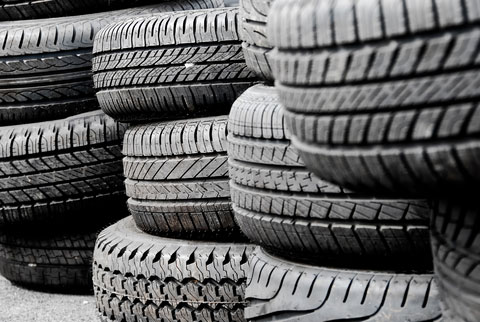The biggest expense for most drivers is fuel. You can’t control the prices at the tank, but you can improve your vehicle’s fuel economy. One of the easiest ways to do that is through proper tire maintenance.
Caring for your tires not only saves you money on gas, it also improves your vehicle’s handling; resulting in a smoother and safer ride.
Proper Inflation
Your tires’ inflation or “pressure” is critical. Improper air pressure means your car needs more energy, or fuel, to move itself. According to the U.S. Department of Energy, you can improve your gas mileage by up to 3.3% just by keeping your tires properly inflated. If you spend $2400 a year on gas, that’s $80 in savings.
Improper tire pressure can also put unnecessary stress on your tires and create uneven tread wear, meaning you’ll have to replace your tires sooner. The proper tire pressure for your vehicle can usually be found in the owner’s manual or on a sticker mounted on the driver’s side door jamb.
Rotate Your Tires Regularly
Tires that aren’t rotated regularly will wear unevenly. Why does this matter? When a tire tread wears down in a particular stress spot, it’s less able to grip snow, stop on wet roads or alleviate road friction. If you rotate your tires regularly, therefore spreading out the tread wear evenly, road friction is decreased and stability and traction are increased. According to the maintenance experts at Tenvoorde Ford, that increase in traction and stability means your car needs less fuel to propel itself forward. As an added bonus, you get a more comfortable ride.
When you get your tires rotated, they’ll also check the alignment. Misaligned tires can cause drag and reduce your fuel efficiency by as much as 10%. Regular tire rotation will save you money on gas, increase the life of your tires and help you avoid expensive repairs.
Replace Your Tires
Despite maintaining proper air pressure and rotating your tires regularly, eventually you are going to need to replace your tires. When that time comes, you should ideally replace all of your tires at the same time and purchase 4 of the same tires.
Why? If the tires on your car aren’t at least very similar you can run into handling problems. For example, let’s say one tire has a stronger grip and response time on a wet road than the other tires on your car; it can make your vehicle harder to control. This can affect your alignment or balancing and it’s a safety concern.
Right Season, Right Tire
If you put snow tires on your car in the winter, remember to replace them with your regular, summer tires once spring comes. Winter tires are designed to grip the road and that increase in traction means your car needs more gas to get up and go. Driving with winter tires on clear roads is unnecessary and a waste of fuel.
Spending money on maintaining your replacing your tires isn’t fun or glamourous, but it will actually save you money in the long run and keep you safer.
